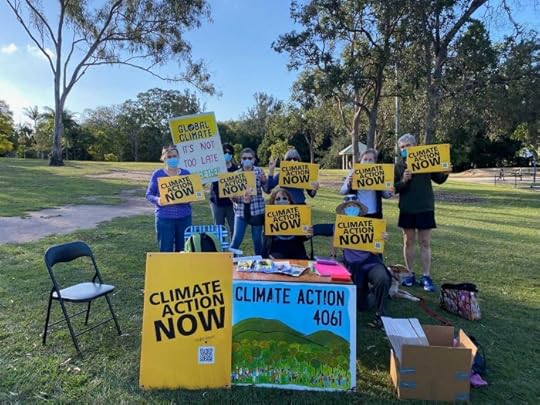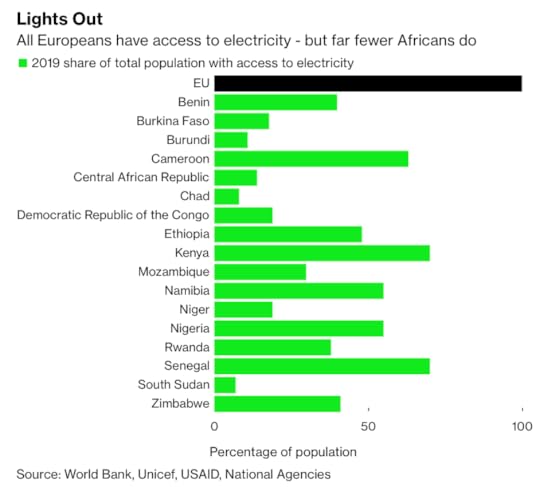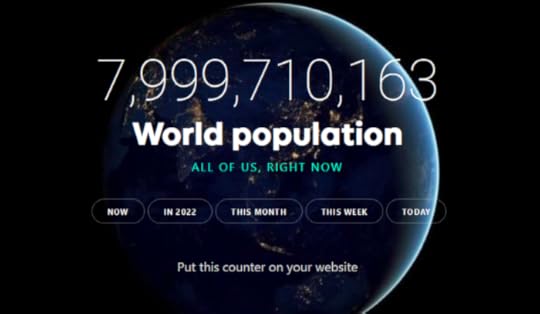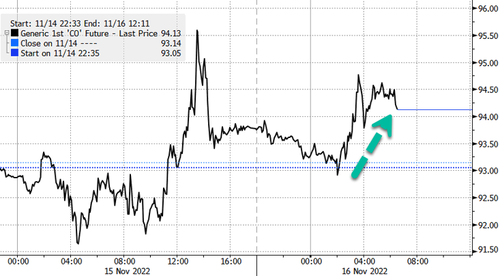Steve Bull's Blog, page 165
November 16, 2022
Welcome to the oil death spiral
There is something deeply tragic about watching people who would be dead within a fortnight without oil nevertheless calling for oil – and fossil fuels more broadly – to be banned immediately. It is possible, of course, that these people believe that food grows inside supermarkets or that the chemicals used to provide clean drinking water can be beamed to the waterworks using Star Trek technology. The hard reality though, is that every aspect of modern living – even for those of us surviving on the margins – depends upon oil… and not just any old oil. The workhorse behind the modern, hi-tech western economies is the roughly 30 percent fraction of an average barrel of oil called diesel.
Take a look around the room where you are reading this. Every item your eyes land upon was, at some point in its life, transported on a truck – if you are in the UK, a large part of it will have arrived on a ship from Asia too. Almost all of those trucks used diesel as a fuel. Some smaller trucks and vans may have used petrol (gasoline) and an even smaller number may have been electric… but only the small ones – you cannot run a large semi using batteries (at least, not if you want to leave some space for cargo).
Take another look around the room for anything made from or with plastic, or anything which is painted or dyed. These, too required oil in their manufacture. Almost everything made of metal or requiring metal as a component began life in the bucket of a diesel-powered crane, which loaded it as an ore onto a diesel-powered mining truck, which delivered it to a fossil fuel-powered grinding machine which, in turn moved the crushed ore to a fossil fuel (coal or gas)-powered smelter.
…click on the above link to read the rest…
Crude Prices Jump After Israeli Tanker Hit By Iranian Drone Off Oman Coast
Crude prices are higher Wednesday morning after a bomb-carrying drone on Tuesday evening struck an oil tanker owned by an Israeli billionaire, The Associated Press reported.
The Liberian-flagged oil tanker Pacific Zircon was approximately 150 miles off the Omani coast at 730 pm local time when a “projectile” hit the vessel, a Mideast-based defense official told AP. AP said the United Kingdom Maritime Trade Operations was notified about the attack and is monitoring shipping lanes in the region.
“We are aware of an incident and it’s being investigated at this time,” UKMTO said.
Also, the commander of the US Navy’s Fifth Fleet, Timothy Hawkins, was briefed on the incident, according to Reuters.
Brent crude prices, which were down before the news, jumped and traded above $94 a barrel.
In a statement, Pacific Zircon’s owner Eastern Pacific Shipping, which Israeli billionaire Idan Ofer owns, said the vessel was hauling diesel when it was “hit by a projectile … there were no reports of injuries or pollution.”
“All crew are safe and accounted for. There is some minor damage to the vessel’s hull but no spillage of cargo or water ingress,” the Singapore- based Eastern Pacific said.
Bloomberg cited a report via the Israeli Public Broadcasting Company (KAN) that said unidentified Israeli officials pointed the finger at Iran for the drone attack. Tracking data shows the vessel is off the Omani coast.
“While no one immediately claimed responsibility for the attack, suspicion immediately fell on Iran. Tehran and Israel have been engaged in a yearslong shadow war in the wider Middle East, with some drone attacks targeting Israeli-associated vessels traveling around the region,” AP noted.
…click on the above link to read the rest…
November 15, 2022
Will the American Empire Collapse in Our Lifetime?
All good things must come to an end.
Even the greatest of civilizations has an expiration date.
This happened to the likes of Ancient Greece and Rome, who were the most advanced civilizations of their respective epochs.
Once prosperous civilizations, eventually met their demise after years of economic and military decline. The arrogance, corruption, and myopia of their respective elites ushered in an irreversible phase of civilizational decline.
For centuries, historians have studied the causes of these civilizations’ respective declines. Elites of previous centuries did the best they could to understand the lessons of the past, and in turn, attempted to build political structures that would avoid similar fates of decline.
The Founding Fathers of the American Republic made sure to learn the lessons of Greece and Rome and create a system of government that would prevent many of the fatal mistakes these civilizations previously made.
While the American experiment has largely been successful, it is starting to go through a predictable phase of civilizational decay.
The past century has witnessed the American political class pursue policies that go against the very nature of the founding of the American Republic. Namely, the adherence to the principles of limited government.
The excessive domestic and military spending, the out of control monetary policy, the cultural decadence…..
Just some of the hallmarks of a civilization that’s clearly in a stage of decay.
It will take a massive awakening of the American populace to reverse course and prevent the country from falling down the predictable route of civilizational collapse.
The US will be no exception to this trend if things don’t reverse course anytime soon.
In the meantime, make sure to check out George Gammon’s video on how the American Empire could potentially collapse.
Climate Action- Right Way, Wrong Way
 Climate Action- Right Way, Wrong Way
Climate Action- Right Way, Wrong Way
It seems everywhere I go these days I see signs saying, “Climate Action- Now!”. But what do people mean by climate action? What exactly are they calling for? Are they calling for the right actions? Is our climate message the right one? Are our demands workable? Will the necessary outcomes be achieved?
It’s time we more carefully analysed our call for climate action to make sure we are focussing on the right message.
From what I can tell the current climate action framing goes a little something like this-
We’re happy to remain within the paradigm of pursuing endless economic growth. For the foreseeable future we will continue to allow corporations and governments to use expanding consumption to drive economic growth. This consumption growth will primarily be driven by population growth fuelled by the mass movements of people from low consumption to high consumption countries.
But we do also want to see the billions of poor lifted to at least a lower middle-class lifestyle- as poverty must be eradicated. We will accept the unavoidable rise in energy and resource demands, and the inevitable rise in waste generation which will accompany that process. But we believe this can be offset by the rich suddenly abandoning their lifestyles and accepting middle class existences. The ecological savings then being distributed among the billions, while we simultaneously achieve the necessary net reductions in emissions, year on year.
So, we’ll ignore the unprecedented size of the human population, and the fact that we have added the last one billion in just 11 years. We will just allow population growth to play out over the next 60–70 years, without sending out any particular messaging other than “It’s good for economic growth”…
…click on the above link to read the rest…
November 14, 2022
Friede Gard Prize Lecture 05 Energy In Production Functions
Both Neoclassical and Post Keynesian economic models have been “energy blind”: postulating output from inputs of Technology, Labor and Capital, but ignoring energy (and matter, for that matter…).
In this lecture I show how tautological and wrong the Cobb Douglas Production Function is, and that incorporating energy into it does enormous damage to the Neoclassical paradigm. On the other hand, the empirically-based Leontief Production Function only needs to acknowledge that what has been called the “Capital-Output Ratio” is in fact the inverse of “the efficiency with which machinery turns energy into useful work”, and Post-Keynesian economic models are now energy-aware.
Imperialism Of The Apocalypse
Rich people are depriving poor people of cheap energy in the name of climate change. Why?
 Clockwise from upper-left: Meghan Markle, Duchess of Sussex; Jennifer Lawrence; Prince Harry; Leonardo DiCaprio. Center: Pakistani boy with woodfuel for cooking (Getty Images)
Clockwise from upper-left: Meghan Markle, Duchess of Sussex; Jennifer Lawrence; Prince Harry; Leonardo DiCaprio. Center: Pakistani boy with woodfuel for cooking (Getty Images)Few appear to care about climate change more than global celebrities. In 2019, Leonardo DiCaprio told the U.N., “Climate Change is our single greatest security threat.” Late last year, DiCaprio and Jennifer Lawrence starred in the Hollywood climate disaster movie, “Don’t Look Up.” Said Lawrence, “You’re watching these hurricanes now and it’s hard, especially while promoting this movie, not to feel Mother Nature’s rage or wrath.” In a United Nations speech earlier this year, Prince Harry said “Climate change is wreaking havoc on our planet, with the most vulnerable suffering most of all.” All have urged individuals and nations to radically reduce their carbon emissions.
And yet global celebrities are, along with global political leaders, the planet’s biggest climate hypocrites. DiCaprio, Lawrence, Harry, and Meghan have been flying on private jets, partying on gas-guzzling yachts, and riding jet skis for years. Already 400 private jets, which are five to 14 times more polluting than commercial flights, have arrived in Egypt for United Nations annual climate talks. Last year, 40,000 people flew to Scotland, many on private jets, for climate talks, generating an estimated 102,000 tons of carbon dioxide, the equivalent of burning 237,000 barrels of oil. After they arrived, they were treated to a video of a talking CGI dinosaur, voiced over by Jack Black, urging African nations to not use fossil fuels.

It’s true that celebrities have promised to do better. DiCaprio flew commercial to climate talks last year. Meghan and Harry flew commercial back to London last year. Lawrence flew commercial after her private plane nearly crashed. And most of the 30,000 participants in this year’s climate talks will arrive in commercial airplanes.
…click on the above link to read the rest…
Pakistan ‘Has No Option But To Ration’ Natural Gas Supply This Winter
Pakistan has no other option but to ration natural gas supply this winter, with gas provided three times a day for cooking to households, amid acute shortages and a forex crisis in the world’s fifth most populous country, an official from the petroleum ministry told a Parliament panel this week.
The energy crisis in Pakistan has deepened this year, and now, natural gas supplies will be very limited for households, according to officials.
“There would be no gas supply (to household consumers) for 16 hours” a day, Muhammad Mahmood told the Parliament’s Standing Committee on Petroleum, as carried by the local outlet Dawn.
Pakistani households will have gas available for three hours in the morning, two hours in the afternoon, and three hours in the evening, Mahmood added.
Pakistan—whose population is the fifth largest in the world after China, India, the United States, and Indonesia—has been experiencing an energy crisis as the country cannot afford to import a lot of energy products at the current high prices. The stronger U.S. dollar and the sky-high LNG prices have worsened the country’s finances, with foreign exchange reserves down in October to their lowest level in three years.
In April, soaring prices of LNG and coal on the international markets left Pakistan with having to cut electricity supply to households and industry as the country, in a deep political and economic crisis, could not afford to buy more of the expensive fossil fuels.
…click on the above link to read the rest…
8 Billion Souls
 By the time you read this, the counter above will have probably hit 8 billion (1). Screenshot from World Population Clock
By the time you read this, the counter above will have probably hit 8 billion (1). Screenshot from World Population ClockWorld population is projected to reach a new milestone — 8 billion people — tomorrow on November 15, 2022. According to United Nations Population Fund chief Natalia Kanem:
“Eight billion people, it is a momentous milestone for humanity, yet, I realize this moment might not be celebrated by all. Some express concerns that our world is overpopulated. I am here to say clearly that the sheer number of human lives is not a cause for fear.”
As usual, I beg to differ: the“sheer number of human lives” is a big issue — although far from being the only factor behind the woes of our civilization. Consumption, pollution load, technology use and inequality (among many other things) also play their roles. Since this is a major milestone in human history though, I felt the need to discuss the effect of population growth separated from these other topics, examining its upshot on our, and on future generations’ lives.
Being fully aware that this is a highly controversial topic, I suggest a simple thought experiment to somewhat distance ourselves from the emotions raised by this issue. Whenever I’m confronted with a difficult question like this (Is hitting 8 billion good or bad news? Are we headed in the right or wrong direction?) I always try to imagine two very extreme outcomes and see which one is better, and ultimately where should we — in my opinion — be headed. (Before you label the author an ‘ecofascist’ I’m not contemplating here on how to reduce living populations, but rather on long term trajectories and their sustainability.)
…click on the above link to read the rest…





